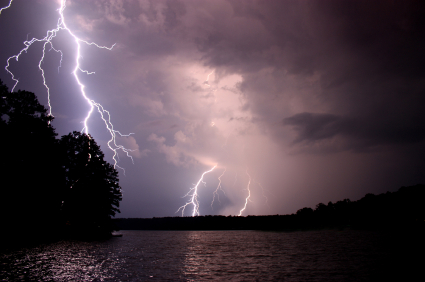When it comes to extreme weather, most carriers must learn to expect the unexpected.

As the warmest year on record and the second most extreme weather year in US history, 2012 marked a watershed moment for the insurance industry. Eleven extreme weather events wreaked at least a billion dollars worth of damage each. Hurricane Sandy alone caused $50 billion in losses. The lion's share of those hits were absorbed by insurers, but a recent report from non-profit sustainability advocates Ceres suggests only a small minority of insurance firms have developed adequate strategies to deal with climate change.
For insurance companies to transition from merely coping with the aftermath of a disaster to implementing a full-blown risk management program, they will have to make a number of major changes to their business model. First and foremost is the need to approach climate change as a corporate-wide strategic issue that must be tackled at every level. They must create catastrophe models to anticipate and mitigate the effects of extreme weather events. Investment and underwriting strategies must adapt or perish.
Engaging more thoroughly with consumers is essential. Mobile communications platforms are invaluable tools for incentivizing consumers to reduce their vulnerability to extreme weather events. The 21st Century attitude to time-critical incidents like storms and flooding is comprised of mass text messaging, cloud call centers and voice broadcasting. Insurance companies ignore these methods of customer interaction at their peril. If the companies that don't employ such strategies continue to fail their clients, the handful that do (just 23 out of the Ceres sample) will reap the benefits. As Ceres president Mindy Lubber states in the foreword to the report:
“Just as the insurance industry asserted leadership to minimize building fire and earthquake risks in the 20th Century, the industry has a huge opportunity today to lead in tackling climate change risks.”
Bulk text messaging and voice broadcasting should be viewed by the insurance industry as vital weapons in the fight against climate-related disasters which have historically been so costly for carriers who are ill-prepared for such events. Preparing for the worst becomes more important as ‘the worst’ becomes more frequent.
After all, homeowners - so directly and emotionally invested in their properties - do not generally hesitate to install flood defenses at the behest of their insurance carrier, even if it means a burdensome financial outlay. And yet the insurance industry repeatedly fails to practice what it preaches. By taking a leaf out of their clients' book and adopting a 'flood resilience' approach - rather than a 'crisis management' one – insurance companies could better bear the brunt of future disasters.
With eleven weather disasters occurring inside a year, it's questionable whether or not these events can even be accurately described as 'extreme' anymore. We need to instead view them as inevitable - even if the ability to precisely predict when and where they will occur remains elusive. If the insurance industry wants to avoid climate quicksand, it needs to pull it's head out of the sand, quick.

As the warmest year on record and the second most extreme weather year in US history, 2012 marked a watershed moment for the insurance industry. Eleven extreme weather events wreaked at least a billion dollars worth of damage each. Hurricane Sandy alone caused $50 billion in losses. The lion's share of those hits were absorbed by insurers, but a recent report from non-profit sustainability advocates Ceres suggests only a small minority of insurance firms have developed adequate strategies to deal with climate change.
For insurance companies to transition from merely coping with the aftermath of a disaster to implementing a full-blown risk management program, they will have to make a number of major changes to their business model. First and foremost is the need to approach climate change as a corporate-wide strategic issue that must be tackled at every level. They must create catastrophe models to anticipate and mitigate the effects of extreme weather events. Investment and underwriting strategies must adapt or perish.
Engaging more thoroughly with consumers is essential. Mobile communications platforms are invaluable tools for incentivizing consumers to reduce their vulnerability to extreme weather events. The 21st Century attitude to time-critical incidents like storms and flooding is comprised of mass text messaging, cloud call centers and voice broadcasting. Insurance companies ignore these methods of customer interaction at their peril. If the companies that don't employ such strategies continue to fail their clients, the handful that do (just 23 out of the Ceres sample) will reap the benefits. As Ceres president Mindy Lubber states in the foreword to the report:
“Just as the insurance industry asserted leadership to minimize building fire and earthquake risks in the 20th Century, the industry has a huge opportunity today to lead in tackling climate change risks.”
Bulk text messaging and voice broadcasting should be viewed by the insurance industry as vital weapons in the fight against climate-related disasters which have historically been so costly for carriers who are ill-prepared for such events. Preparing for the worst becomes more important as ‘the worst’ becomes more frequent.
After all, homeowners - so directly and emotionally invested in their properties - do not generally hesitate to install flood defenses at the behest of their insurance carrier, even if it means a burdensome financial outlay. And yet the insurance industry repeatedly fails to practice what it preaches. By taking a leaf out of their clients' book and adopting a 'flood resilience' approach - rather than a 'crisis management' one – insurance companies could better bear the brunt of future disasters.
With eleven weather disasters occurring inside a year, it's questionable whether or not these events can even be accurately described as 'extreme' anymore. We need to instead view them as inevitable - even if the ability to precisely predict when and where they will occur remains elusive. If the insurance industry wants to avoid climate quicksand, it needs to pull it's head out of the sand, quick.